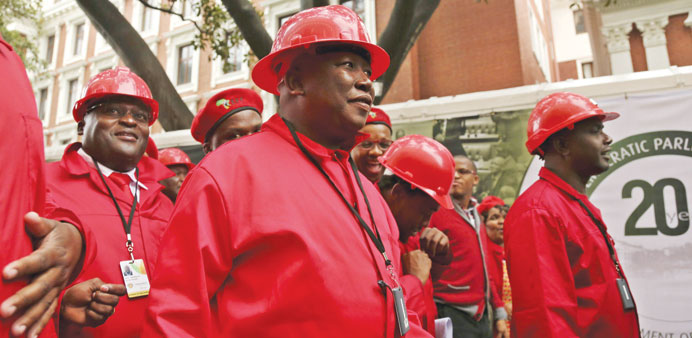AFP/Pretoria
South African President Jacob Zuma was elected for a second five-year term by parliament yesterday, as radical lawmakers shook up the normally staid proceedings.
An attempt by the opposition to have Zuma declared unfit for office because of alleged graft that was deemed to be in conflict with the constitution was brushed aside and he was elected unopposed.
Zuma, who heads liberation leader Nelson Mandela’s African National Congress (ANC), had seen his personal image battered by a scandal over the spending of some $23mn of state funds on his rural home.
But he was assured of a second term by the ANC-dominated parliament, which swept to power in elections earlier this month.
He is due to be sworn in on Saturday.
The expected formality of the re-election was disturbed only by new lawmakers from the Economic Freedom Fighters (EFF), who turned up at parliament in bright red overalls, red hardhats and Wellington boots.
The EFF charges that the ANC has betrayed the trust of poor black South Africans since taking power at the end of apartheid 20 years ago.
The newly formed party, led by breakaway ANC youth league firebrand Julius Malema, won 25 seats in the 400-seat parliament in elections earlier this month.
But the sole challenge to Zuma’s nomination came from the official opposition, the centrist Democratic Alliance, which did not put forward an alternative candidate once its objection had been rejected.
The ANC lost ground compared to the previous elections in 2009, but still won an overwhelming victory with 62% of the vote.
Before entering parliament, EFF lawmakers danced and sang revolutionary songs on the steps of the imposing building in central Cape Town as a light drizzle obscured the iconic Table Mountain in the background.
Members of parliament representing other parties wore traditional suits and frocks.
Explaining the overalls—which some MPs, including Malema, had tucked into Wellington boots—lawmaker Mpho Ramakatsa told AFP it was to prove they were there to represent the poor and the workers.
“This is to show we are not going to be swallowed by the system, that our presence in parliament doesn’t mean we will forget you,” he said.
Malema’s symbolic Wellingtons, known in South Africa as gumboots and worn by a wide range of workers, were a marked change from his preferred—and pricey—Louis Vuitton shoes.
EFF policies include nationalising the mines and taking over white-owned land without compensation, which have sent shivers through Africa’s second-biggest economy and its international investors.
While his election was purely a formality, Zuma’s announcement of his cabinet on Sunday will be watched more closely.
With the country’s economic problems mounting and investors parking their money on the sidelines waiting for reform, Zuma’s choices could have far-reaching consequences.
He faces a choice of either moving to the left to confront a looming socialist challenge, or to the right in an attempt to stimulate growth and employment, says veteran political commentator Allister Sparks.
The threat to the ANC from the left could grow exponentially if a major union goes ahead with plans to form a Workers’ Party, Sparks wrote in the Cape Times yesterday.
“Such a party would surely subsume the EFF and be a serious challenger to the ANC,” he said.
On the opposite flank the Democratic Alliance has also made inroads in the last elections, winning 22% of the vote, up from 17% in 2009.
Investors will welcome unionist-turned-businessman Cyril Ramaphosa’s appointment as deputy president.
But they will also be looking to see who gets top economy-related portfolios as an indicator of whether the much-vaunted and little-implemented National Development Plan will become more than words.

Economic Freedom Party (EFF) leader Julius Malema (C) arrives to be sworn in as a member of parliament in Cape Town yesterday.
